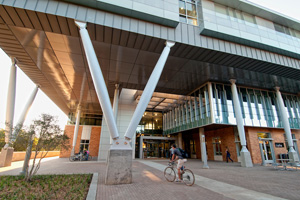|
|
|
|
|
|
 |
|
New in-demand degrees include Texas' first and only master's in artificial intelligence
To help give students marketable, real-world skills, UNT will begin offering several new and ground-breaking degrees for Fall 2020. The College of Engineering, will offer bachelor's and master's degrees in cybersecurity, a Master of Science in engineering management and Texas' first and only Master of Science in artificial intelligence. UNT at Frisco's project design and analysis program, is now a fully available cohort degree program allowing undergraduate students to earn their degree in three years and graduate with relevant, hands-on experience through project-based learning with top industry partners. Two new M.B.A. programs will launch: an online degree in sport entertainment management with the Dallas Cowboys and a hands-on degree in music business, a collaboration between UNT's G. Brint Ryan College of Business and College of Music. Also, in Fall 2021, the Department of Geography and the Environment in the College of Liberal Arts and Social Sciences will offer a degree in geographic information systems + computer science. UNT is committed to providing the most innovative degree programs to keep the university and its students at the forefront of industry trends that are moving our world forward.
|
|
|
|
|
|
|
|
 UNT and GSVlabs bring world's largest virtual business incubator to North Texas region UNT and GSVlabs bring world's largest virtual business incubator to North Texas region
UNT and GSVlabs, a Silicon Valley-based global innovation services company, have launched a technology platform to provide real-world support for UNT students, staff, faculty and aspiring North Texas entrepreneurs who want to transform creative ideas into innovative businesses. UNT Passport offers access to a global entrepreneurship community, venture capital firms and mentorship from DFW-based business owners, UNT alumni and international experts to further boost the entrepreneurship ecosystem in the North Texas region. The platform also includes a network of Denton and UNT alumni angel investors, along with programs offered through UNT's Murphy Center for Entrepreneurship and Innovation.
|
|
|
|
|
|
| Mohanty receives Fulbright for IoT security |
Computer science and engineering professor Saraju Mohanty recently received a Fulbright U.S. Specialist Award to collaborate on a project focused on security, communication and interoperability in areas where long-range communications with lower power are needed for the Internet of Things (IoT). His expertise in hardware-assisted security — including designing the first low-power digital watermarking chip and integrating security features with a secure digital camera — will serve as a foundation for this project. Mohanty will travel to India to work with collaborators when pandemic conditions allow.
|
|
|
|
|
|
|
| Honoring contributions |
|
Kent Chapman, Regents Professor of biology and director of UNT's BioDiscovery Institute, has been named the 2020 laureate of the International Symposium on Plant Lipids' Terry Galliard Medal, which honors a scientist who contributes significantly to the field of plant lipid research. Additionally, Jantana Keereetaweep, who earned her Ph.D. from UNT working alongside her mentor Chapman, received the same organization's Paul K. Stumpf award, presented to a promising early-career researcher. Chapman has spent 27 years at UNT exploring the intricacies of plant biochemistry. He collaborates with researchers all over the globe on diverse projects such as a recent project to sequence the DNA of the jojoba tree.
|
|
|
|
|
|
|
| Protecting soldiers in the field through drone research |
|
UNT graduate student Kelly Jacques is using her engineering talent to minimize the need for soldiers on the battlefield. "I believe the more drones we use," Jacques says, "the fewer soldiers will be on the ground." During her undergraduate career at UNT, she conducted research on how to create more efficient military drones. Jacques, who recently graduated with a B.S. in materials science and engineering, is a 2020 recipient of the U.S. Department of Defense's SMART (Science, Mathematics and Research for Transformation) scholarship that will cover the cost of tuition, books and living expenses as she pursues her Ph.D. at UNT this fall. After graduation, she will work at the U.S. Department of Defense.
|
|
|
|
|
|
|
| Checking in on collegiate athletes during pandemic |
|
UNT's Center of Sport Psychology and Performance Excellence has released results in an ongoing study examining the overall health, performance and psychological wellbeing of collegiate athletes during the pandemic. When the NCAA canceled sports seasons and many students had to leave their campus housing due to the surge in COVID-19, UNT psychology professor and sport psychologist Trent Petrie had planned to look at the mental health of graduating athletes, but quickly pivoted once the pandemic began to gather insight on how a broader group of collegiate athletes was handling the abrupt changes the virus has dealt.
|
|
|
|
|
|
|
| Identifying toxic silver ions |
|
Chemistry research assistant professor Sreeker Marpu and professor Mohammad A. Omary have developed a patent-pending test to more easily identify toxic silver ions, which can be harmful at high concentrations. Silver nanoparticles (AgNPs) are well known for their antimicrobial properties and can be found in a number of products such as bedding, toothpaste and toys. But, over time, toxic silver ions can leach from AgNP products into the surrounding environment. Differentiating between silver nanoparticles and silver ions is important in both determining the toxicity of a substance and the time it takes silver ions to leach from various products — knowledge that could have a huge impact on the environment.
|
|
|
|
|
|
|
| Helping autonomous vehicles 'talk' to each other |
|
While autonomous vehicles have advanced significantly over the last decade, one persistent problem remains: perception. Like human drivers, the vehicles can only react to the information they collect. But UNT computer science and engineering assistant professor Qing Yang believes he can help make self-driving cars perceptive enough to drive safely on public roads by making data collection and processing more efficient and robust through machine learning. Yang is the principal investigator for a $400,000 National Science Foundation grant in collaboration with the University of Massachusetts at Dartmouth.
|
|
|
|
|
|